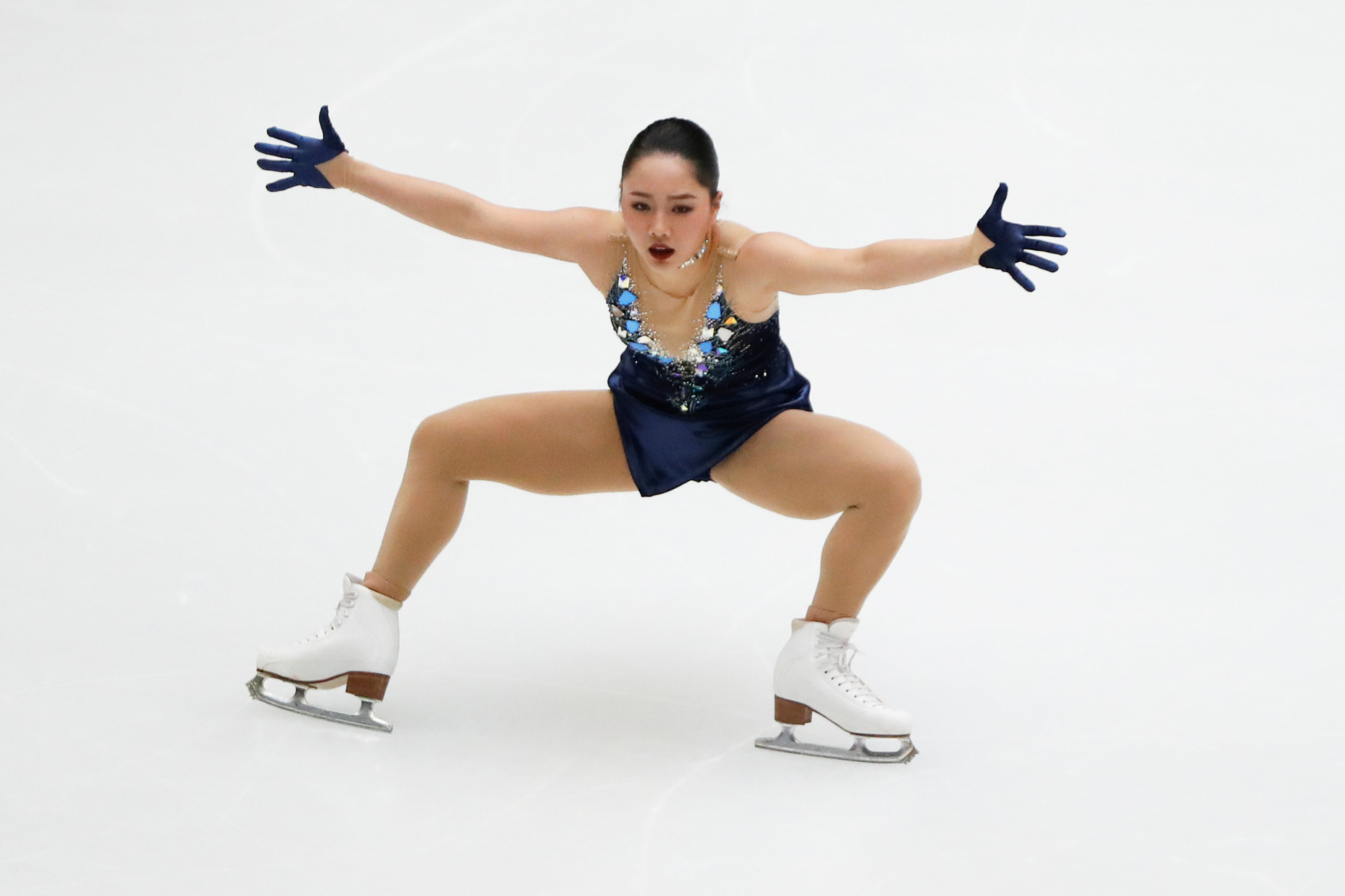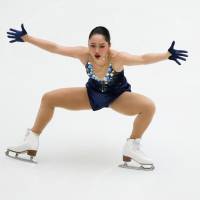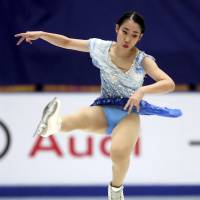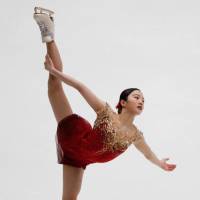Enough of this nonsense.
What am I talking about?
Skaters winning competitions and then being given the silver medal.
Latest case in point: Wakaba Higuchi at the Cup of China on Saturday.
Going into the free skate in second place, just 0.12 behind Canada's Gabrielle Daleman, Higuchi gave an absolutely fantastic performance to "Skyfall" that moved those in attendance and watching around the world.
Higuchi cleanly landed seven triples in her free skate and competed with such emotion and joie de vivre that it was absolutely pulsating. She looked great in her dark blue outfit and executed her elements flawlessly.
Her reward: Second place.
Russia's Alina Zagitova, the world junior champion, is clearly a gifted and talented skater, but she doesn't have the presentation polish that Higuchi has. Furthermore, Zagitova's program was a lopsided one that had all of the jumps in the second half so she could receive a bonus for each one.
Zagitova vaulted from fourth place after the free skate to victory with a total of 213.88 to Higuchi's 212.52. What is important to note here is that Higuchi was more than a point ahead of Zagitova (70.53 to 69.44) going into the free skate, skated cleanly, and still lost.
Zagitova, a 15-year-old from Moscow, even fell on her combination jump in the short program.
Zagitova's tactic of backloading her program with all of the jumps is certainly within the rules, but it is precisely why many, including skating legend Dick Button, have become disenchanted with the sport.
To put it simply, it's just not right.
She has divided her program into two parts — one creative, one athletic. This is exactly what happened last season at the world junior championships where Zagitova edged Marin Honda for the title when many observers felt Honda should have won.
Here we are nearly four years removed from the Yuna Kim-Adelina Sotnikova fiasco in Sochi and nothing has changed. The winner gets the silver, and second place gets the gold.
This is why so many fans have been turned off by skating in recent years. They have trouble believing in it because they trust their own eyes, not anonymous judging.
The analysts raved about both of Higuchi's programs in Beijing despite the result.
Eurosport commentator Mark Hanretty was moved by the Tokyo native's short program to "Gypsy Dance."
"I thought that was brilliant," Hanretty stated. "The judges have their five component scores. In terms of interpretation score, movement, and steps in time to the music, and expression of the music's character, and that was delivered brilliantly by Wakaba."
Hanretty's broadcast partner Simon Reed echoed his sentiments.
"Wonderful. What a performance that was!" Reed commented. "Got it all together. What strength she has. The music excellently portrayed on the ice. It was great to watch."
Hanretty admired Higuchi's double axel.
"This lady, so far on the Grand Prix circuit, is the lady I think is showing the most improvement and progression since last season," he said. "That opening double axel was so strong and so solid. Takes a bracket turn into to ensure there is content before and transitional content out."
It was more of the same from Tracy Wilson, one of Yuzuru Hanyu's coaches, on the Olympic Channel telecast.
"This program, artistically, it was beautifully musical," Wilson noted. "She used the music, interesting choreography, all aspects very strong."
Higuchi's free skate earned more plaudits from the experts.
Four-time world champion Kurt Browning, speaking on the CBC telecast, admired Higuchi's power.
"What I really like about her is her ability to transition up into the air. Nice and clean," Browning stated. "This is a very well constructed program we are seeing by Wakaba. Great skating skills. Always speed."
David Pelletier, also on CBC, was effusive in his analysis.
"I loved the electricity. The energy that went through her limbs with every movement," Pelletier said. "She was able to keep my attention, and the footwork and the spins, the commitment. Every movement had a purpose and a musicality to it."
Browning then revealed some interesting inside information.
"I was lucky enough to be on the ice when Wakaba was working with (choreographer) Shae-Lynn Bourne," Browning commented. "Not very many skaters she works with can do the moves even close to as good as Shae-Lynn. But she (Higuchi) has an instinct and a trust that really comes through."
Hanretty delivered the most damning indictment of the judging of the event.
"The program is brilliant. From a choreographic standpoint, in terms of a performance, I prefer this," he said. "On the second mark (program components) I would give this the lead. She has more speed. Therefore the skating skills should be a little higher.
"I really enjoyed Wakaba. I thought she was underscored in the short program. I would have given her more on the second mark in the short."
Hanretty's last comment was most telling — "underscored in the short program." This was precisely the scenario Kim faced in Sochi. She should have had a solid lead going into the free skate, but instead was just 0.28 ahead of Sotnikova.
Kim came through with a flawless free skate, in the most difficult conditions imaginable, and was rewarded with the silver medal. It was a disgrace.
Wilson, one of the top coaches in the world, lavished praise upon Higuchi while evaluating her free skate.
"Note the speed she takes both into her jumps and out on the landings. This is an unbelievable performance," Wilson commented. "Not a foot wrong. Look at the speed and the ice coverage, unmatched so far in this competition. Full expression. That was sensational."
Wilson especially liked the confidence Higuchi displayed.
"I thought it was a very mature interpretation for a 16-year-old. Fluid skating, quite detailed choreography," she said.
"There wasn't a flicker of doubt throughout the performance. Not a moment where she appeared to be drawing herself in. Just felt full on all the time. I like the artistry of the program and the speed."
Higuchi was third at the Cup of Russia last month, and the two podium finishes should be good enough to qualify her for the Grand Prix Final in Nagoya in December.
Mihara misses out on podium
Mai Mihara (206.07) finished a disappointing fourth behind Russia's Elena Radionova (206.82) in her Grand Prix season debut but made an impact on those who know the business best.
Following Mihara's short program to "Libertango," Wilson cited the Kobe native's outstanding technique and skilled edge work.
"Jumps woven into the choreography of the program. Look at the edge work here," Wilson stated. "Bouncy knees. Wonderful control with her body. It feels like she is riding the blade, twisting, turning above it.
"I artistically loved this performance. I thought it was very, very complex choreography. Rich with steps and nuances.
"Her use of the knee bend is wonderful for the way she saves the jumps, the spring on the takeoff propels her across the ice as well. Everything in good balance and proportion."
Mihara, who finished fifth at the world championships last season, skated to "Gabriel's Oboe" in her free skate and landed seven triples. She received praise and advice from Browning, one of the giants of the sport, afterward.
"She is putting on a bit of a clinic as far as clean jumping," he said. "Everything in the right spot. Clean jumping, everything in the right place. Balance over the blade going in. Not a lot of speed, that would be one area she could work on.
"She skates it with a calm majesty. She carries the music with such ease. She has so much patience in her edges and takeoffs, and she holds her landings."
Despite coming in fourth, the belief here is that Mihara is still well positioned to make the Olympic team for Pyeongchang. She and Higuchi are clearly the frontrunners, especially with Satoko Miyahara's condition still in question.
Honda's Olympic dreams fade
Marin Honda's hopes of making the team for Pyeongchang took a real hit in China as she came in fifth (with 198.32) for the second straight week. Though only 16, the expectations for Honda in her first senior GP season are immense, and the fact is that she has not met them at this point.
Her result in Beijing means she will not make the GP Final this season.
Honda under-rotated the back end of her opening triple flip/triple toe loop combination in her short program to "The Giving" but still glittered with her significant skills.
"Elegant back, graceful, lyrical arms. Lovely expression," observed Wilson. "She has such a bright, kind expression. You really have the sense that she loves to skate."
Wilson then added a compelling nugget of her own.
"Her coach Mie Hamada, told me at Skate Canada, she 'thinks the world of Marin but says she still is a little bit inconsistent,' " Wilson said.
Honda doubled the front end of her planned triple flip/triple toe loop early in her free skate to "Turandot" and under-rotated a triple flip later in the program.
Despite the miscues, Honda's potential was very evident in her free skate.
"I really appreciate and enjoy her posture. She has such a lovely neckline," stated Hanretty. "Very elegant look across ice."
Wilson identified Honda's silky skating in her analysis.
"She believes her artistry is her strength," Wilson said. "Love her smoothness and ease across the ice. Pressuring the blade. You really feel like she is riding the edges and not working. It is the momentum that carries her across the ice."
In spite of all the recognition, it appears that only a miracle victory at the Japan nationals is going to put Honda on the plane for Pyeongchang. That may not be what her sponsors and the Japan Skating Federation want to hear, but it is the reality.
NHK Trophy up next
The GP circuit moves to Osaka this week for the NHK Trophy. World champion Yuzuru Hanyu will be joined by compatriots Hiroaki Sato and Kazuki Tomono in a field that includes Russia's Dmitri Aliev and American Jason Brown.
Miyahara will compete for the first time in nearly a year with teammates Rika Hongo and Yuna Shiraiwa against the likes of two-time world champion Evgenia Medvedeva, Carolina Kostner and Mirai Nagasu.




















With your current subscription plan you can comment on stories. However, before writing your first comment, please create a display name in the Profile section of your subscriber account page.